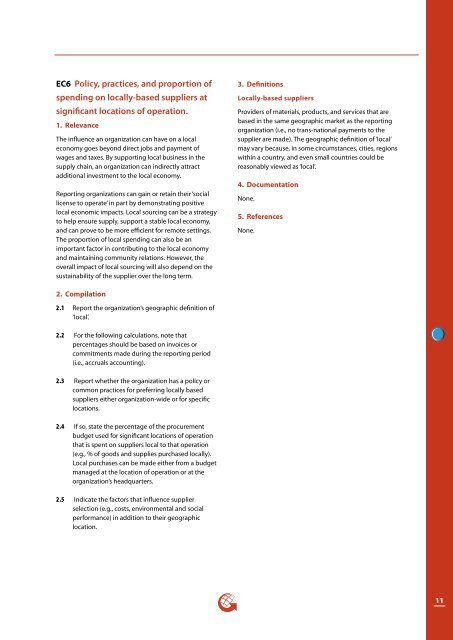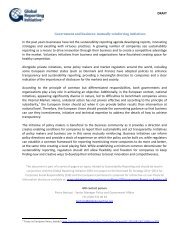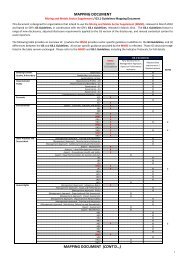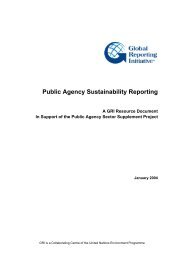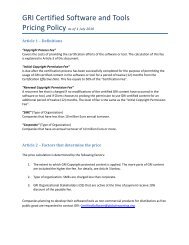Event Organizers Sector Supplement - Global Reporting Initiative
Event Organizers Sector Supplement - Global Reporting Initiative
Event Organizers Sector Supplement - Global Reporting Initiative
You also want an ePaper? Increase the reach of your titles
YUMPU automatically turns print PDFs into web optimized ePapers that Google loves.
EC6 Policy, practices, and proportion of<br />
spending on locally-based suppliers at<br />
significant locations of operation.<br />
1. Relevance<br />
The influence an organization can have on a local<br />
economy goes beyond direct jobs and payment of<br />
wages and taxes. By supporting local business in the<br />
supply chain, an organization can indirectly attract<br />
additional investment to the local economy.<br />
<strong>Reporting</strong> organizations can gain or retain their ‘social<br />
license to operate’ in part by demonstrating positive<br />
local economic impacts. Local sourcing can be a strategy<br />
to help ensure supply, support a stable local economy,<br />
and can prove to be more efficient for remote settings.<br />
The proportion of local spending can also be an<br />
important factor in contributing to the local economy<br />
and maintaining community relations. However, the<br />
overall impact of local sourcing will also depend on the<br />
sustainability of the supplier over the long term.<br />
3. Definitions<br />
Locally-based suppliers<br />
Providers of materials, products, and services that are<br />
based in the same geographic market as the reporting<br />
organization (i.e., no trans-national payments to the<br />
supplier are made). The geographic definition of ‘local’<br />
may vary because, in some circumstances, cities, regions<br />
within a country, and even small countries could be<br />
reasonably viewed as ‘local’.<br />
4. Documentation<br />
None.<br />
5. References<br />
None.<br />
2. Compilation<br />
2.1 Report the organization’s geographic definition of<br />
‘local’.<br />
2.2 For the following calculations, note that<br />
percentages should be based on invoices or<br />
commitments made during the reporting period<br />
(i.e., accruals accounting).<br />
2.3 Report whether the organization has a policy or<br />
common practices for preferring locally based<br />
suppliers either organization-wide or for specific<br />
locations.<br />
2.4 If so, state the percentage of the procurement<br />
budget used for significant locations of operation<br />
that is spent on suppliers local to that operation<br />
(e.g., % of goods and supplies purchased locally).<br />
Local purchases can be made either from a budget<br />
managed at the location of operation or at the<br />
organization’s headquarters.<br />
2.5 Indicate the factors that influence supplier<br />
selection (e.g., costs, environmental and social<br />
performance) in addition to their geographic<br />
location.<br />
11


